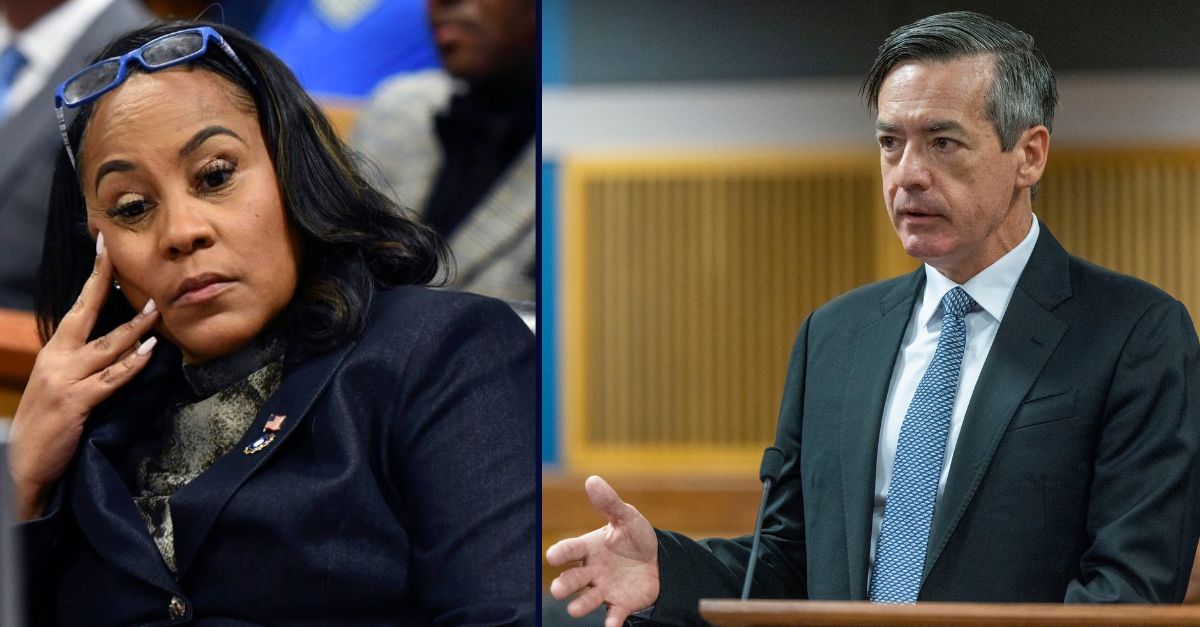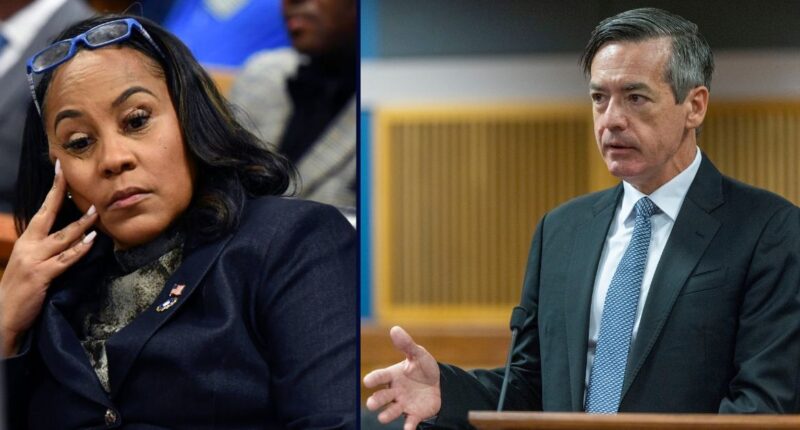
On the left side, we see Fulton County District Attorney Fani Willis in a photo taken during a hearing related to Harrison Floyd, a key figure in the group Black Voices for Trump, as part of the Georgia election cases on November 21, 2023, in Atlanta. The image credit goes to Dennis Byron from Hip Hop Enquirer via AP. On the right side, there is a picture of Kenneth Chesebro speaking to Fulton County Superior Court Judge Scott McAfee. It was captured during a court session where Chesebro agreed to a plea bargain offered by the Fulton County district attorney at the Fulton County Courthouse on October 20, 2023, in Atlanta. The photo credit is given to Alyssa Pointer from Pool Photo via AP.
Attorney Kenneth Chesebro is asking a court in Georgia to invalidate his guilty plea in the beleaguered but ongoing racketeering (RICO) and election interference case out of Fulton County.
Chesebro is widely known as one of the authors of the so-called “coup memos” that offered legal opinions on how Donald Trump could overturn the results of the 2020 presidential election in a “constitutionally defensible manner.” Specifically, the New York attorney was a chief architect of the alternate or “fake” electors plan.
For that plan, Chesebro was charged with a total of seven counts in the wide-ranging indictment filed by embattled Fulton County District Attorney Fani Willis. Those charges included one alleged RICO violation, one count of conspiracy to commit impersonating a public officer, two counts of conspiracy to commit forgery in the first degree, two counts of conspiracy to commit false statements and writing, and one count of conspiracy to commit filing false documents.
In October 2023, days before his case was slated to go to trial, Chesebro pleaded guilty to one count of conspiracy to commit filing false documents – in exchange for Willis dropping the six other counts. As part of his deal, Chesebro agreed to testify for the state against the remaining defendants and received a sentence of five years probation, 100 hours of community service and a $5,000 fine.
Now, second thoughts have been formalized.
In a five-page plea in bar dated Tuesday and docketed Wednesday, Chesebro is challenging indictment itself on the basis the count pleaded guilty to was subsequently invalided by the trial court.
“A plea in bar is a challenge to the validity of the indictment,” the motion reads. “This mechanism can be utilized post-conviction.”
On Sept. 12, Fulton County Superior Court Judge Scott McAfee, who previously tossed out several other charges in the slowly-but-consistently-dwindling case, quashed three counts under the doctrine of federal preemption. With that order, counts 14, 15, and 27 were tossed. The judge explained that an 1890 U.S. Supreme Court decision stylized as In re Loney “preempts the State’s ability to prosecute perjury and false filings in a federal district court.”
Chesebro’s motion notes that it is “beyond the jurisdiction” of a Georgia prosecutor “to punish anyone” for behavior in federal court.
McAfee described his reasoning as follows, at length:
Applying this reasoning to the facts alleged in the indictment, filing a document in a federal court is sufficiently analogous to providing testimony. Punishment for filing certain documents would enable a state to constrict the scope of materials assessed by a federal court and impair the administration of justice in that tribunal. At its core, Loney concerns the ability of a federal tribunal to police its own proceedings. Counts 14 and 15, as alleged here, interfere with the District Court’s ability to do just that by imposing a state sanction when a federal sanction is already in place.
In the latest defense motion, Chesebro’s defense attorney cites several sources of Georgia law to argue that “a defendant cannot plead guilty to a charge that does not constitute a crime.”
And here, the defense says, subsequent trial court proceedings have rendered the false document conspiracy charge dead letter.
One case cited notes that a guilty plea waives all defenses “except that the indictment failed to charge [a defendant] with a crime.”
Another precedent used by the defense reads: “[I]f a defendant can admit all the allegations contained in the indictment and still not be guilty of a crime, then the indictment has failed to sufficiently allege that the defendant committed a crime and the resulting plea is void.”
The defense motion argues that fundamental liberty interests protected by the U.S. Constitution are also implicated in the ex post facto legal issue brought to the court this week.
“Beyond the requirement of Georgia law that Mr. Chesebro’s plea be voided, and Count 15 dismissed forthwith, a failure to grant the requested relief would violate the Due Process Clause of the Fourteenth Amendment,” the defense motion reads.
And, Chesebro’s attorney Manny Arora marshals some federal precedent on the issue of punishment for a nonexistent crime.
The motion cites an 1879 Supreme Court case which reads, in relevant part: “An unconstitutional law is void, and is as no law. An offence created by it is not a crime. A conviction under it is not merely erroneous, but is illegal and void.”
The motion concludes with a citation from a 1981 Fifth Circuit Court of Appeals case: “Nowhere in this country can any man be condemned for a nonexistent crime.”
Now, the Chesebro matter returns to McAfee – who retains jurisdiction at the first stage of any post-conviction proceedings.
Meanwhile, the overarching case is in a state of limbo.
Recall, the sprawling, 98-page, 41-count criminal indictment was released on Aug. 14, 2023. In that document, Trump and 18 others were accused of myriad election-related crimes — premised on an alleged conspiracy to overturn the state’s 2020 election results.
By late 2023, four codefendants accepted plea deals; six other codefendants rejected similar deals that would have required guilty pleas. At the same time, by late January of this year, nine codefendants joined together in a semi-successful effort to have Willis and her entire office disqualified from the case.
That effort to disqualify Willis and/or dismiss the indictment entirely picked up steam — all but kiboshing district court proceedings in the case. The dismissal case is now before the state’s court of appeals – but in late November, after Trump was elected to become the nation’s 47th president, the appellate court mysteriously paused further proceedings “until further notice.”
Willis, for her part, has said she intends to continue trying the case despite the number of remaining defendants when all is said and done with pretrial motions and ancillary appeals.















